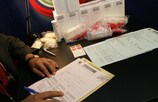New UEFA anti-doping regulations and WADA prohibited list
Wednesday, January 7, 2015
Article summary
The new UEFA Anti-Doping Regulations and World Anti-Doping Agency (WADA) list of prohibited substances and methods have both come into force at the start of the year.
Article top media content

Article body
A new edition of the UEFA Anti-Doping Regulations came into force on 1 January 2015. These regulations are harmonised with the new World Anti-Doping Code (WADC) and with the new FIFA Anti-Doping Regulations, both of which came into effect at the same time. The new regulations apply to all aspects of the UEFA anti-doping programme, including controls both in and out of competition.
With the exception of new doping control forms that will be introduced to improve the efficiency of the testing process, these regulations will not change the doping control process for teams or players.
In line with mandatory changes to the WADC, sanctions for intentional doping have been increased from two to four years; however, a more flexible regime will allow for individual case management in positive tests involving social drugs or contamination.
At the same time, new anti-doping rule violations of complicity and prohibited association have been introduced to punish any person who helps with doping, is involved in doping, or associates with someone sanctioned for doping.
Other changes include new clauses about data privacy and the sharing of information between UEFA and other anti-doping organisations, in preparation for the introduction of the Athlete Biological Passport at the beginning of the 2015/16 season.
The changes are described in full in circular letter No. 57/2014, which was sent on 16 December to all national associations and to clubs currently participating in UEFA competitions, and which can be found in the supporting documentation section on this page.
The WADA 2015 prohibited list
Like the new UEFA Anti-Doping Regulations, WADA's 2015 List of Prohibited Substances and Methods also came into force on 1 January 2015.
The list – which can be found in the supporting documentation to the right of this page – specifies substances and methods prohibited in sport. Implementation of the list is mandatory for organisations that have adopted the World Anti-Doping Code.
The 2015 list contains some changes compared to the 2014 list. The main changes are as follows:
S2. Peptide Hormones, Growth Factors, Related Substances and Mimetics
• The title of this section has been changed: mimetics have been added to reflect the fact that synthetic analogues are also prohibited under this section.
• The HIF stabiliser sub-section is now a separate paragraph to highlight the growing importance of these drugs and to specifically identify HIF activators such as xenon and argon.
S5. Diuretics and Masking Agents
• The title and subsequent paragraphs have been modified to reflect the fact that diuretics are not only masking agents, but can also be abused for other purposes such as the induction of rapid weight loss.
M2. Chemical and Physical Manipulation
• The term "surgical procedures" has been added to the sentence describing the situations in which the administration of intravenous infusions or injections of more than 50ml every six hours is permitted when medically required.
S9: Glucocorticoids
• Glucocorticosteroids are now described as Glucocorticoids to reflect current nomenclature and use.
Impact of these changes on the therapeutic use exemption (TUE) procedure
Despite the changes to the Anti-Doping Regulations and to the WADA Prohibited List, UEFA's rules and procedures governing TUEs, which are harmonised with those of FIFA, remain essentially the same as in 2014.
Players who are participating in UEFA competitions or in senior international (national A team) friendly matches and have to use a prohibited substance or prohibited method for therapeutic purposes must request prior authorisation from UEFA by means of a UEFA TUE application form.
The TUE application form must be completed and signed by such players and their doctors, and then sent with a complete file of medical evidence to the UEFA medical and anti-doping unit. Except in cases of serious medical emergency, doctors must not administer a prohibited substance or prohibited method before a TUE has been granted by UEFA.
For more details on TUEs, including the recognition process for TUEs previously granted by national anti-doping organisations, please refer to the document "Guide to the WADA Prohibited List and TUEs" which is available in the supporting documentation on this page.







